I’m a firm believer that using the native language to communicate with locals in a foreign land is a wholesome experience. Apart from the fun of learning a new language, by speaking to locals in their own tongue, you’ll be able to endear yourself to them even more as a tourist.
There are some languages that are easy to pick up and some which are hard. I would rate Greek as somewhere in the middle of the spectrum. That’s only because the Greek alphabet is more unique compared to Spanish and French. However, all you really need are these 30 basic phrases and you’ll be able to explore Greece like a true local!
Common words and greetings
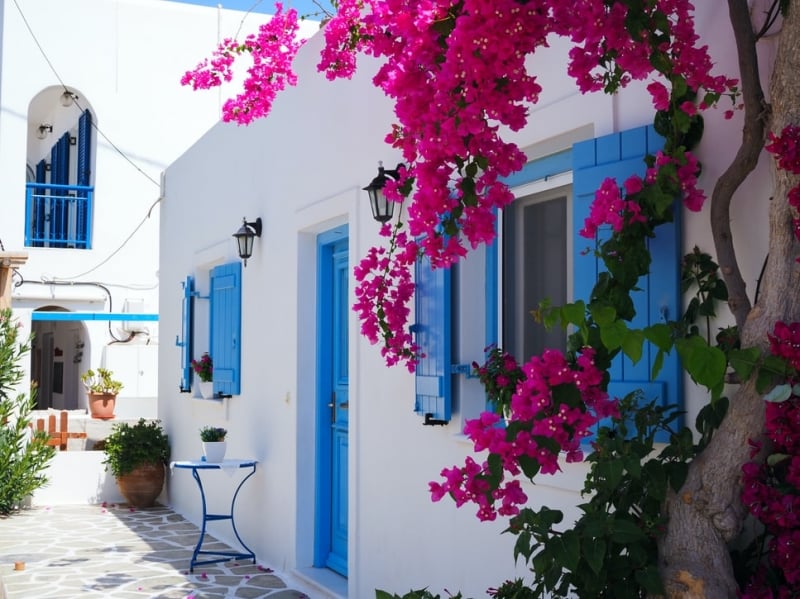
1. YAH-soo – Hello and goodbye
Of course, every conversation starts with a simple “hello”! The unique thing about the Greek language is that “hello” and “goodbye” are the exact same words. Much like ciao in Spanish/Italian and annyeong in Korean, yah-soo can be used as both a greeting and farewell. Don’t worry about confusing the locals, they’ll probably know what you mean based on context.
Of course, if you want to flex your basic Greek even more, replace the simple “hello” with greetings that suit the time of day! They may look a mouthful but once you get the hang of it, I’m sure you’ll impress more than just a few locals!

2. May LEH-neh – My name is…
While you may not need to make your name known to everyone you meet in Greece, it certainly helps to know how to do so anyway. I mean, who knows? You might even meet someone you fancy off the coast of Santorini! -wink-
3. Hárika polí – Pleased to meet you

Instead of flashing an awkward smile after meeting someone for the first time, say this instead! They’ll be impressed both by your basic Greek and your good manners!
4. Ti kánete? – How are you?
In case you DO meet someone nice, this is a fair way to start a conversation. We can’t guarantee you’ll understand their reply but hey, it’s the thought that counts!
5. Eff-kha-ri-STO – Thank you
A good tourist is a polite tourist. Effkharisto is probably the word you’ll be using most often when you’re in Greece. So take some extra time to nail the pronunciation! Thankfully, it’s pronounced the same way it’s spelt!
6 Para-kah-LOE – Please/You’re welcome
Another Greek word with a double meaning! You’ll most likely be using this word to say “please” more often than not but it can mean “I beg your pardon”.
7. Neh – Yes; OH-hee – No
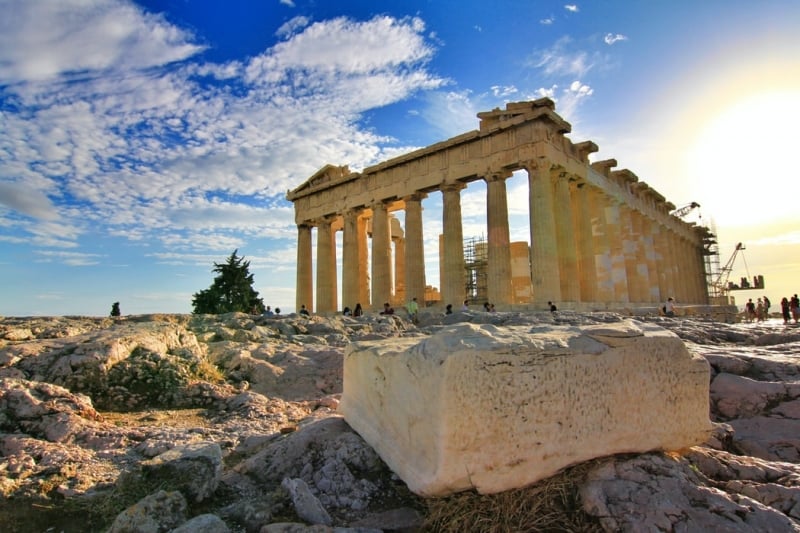
As in “neh”, I would like to visit the Acropolis in Athens, but “Ohhee”, I do not want to walk all the way there in the summer heat!
8. See-GHNO-mee – Sorry/Excuse me
Athens is often crowded throughout the day, especially at tourist hotspots. In case you find someone blocking your way, use this to get their attention and ask for passage. If you stepped on their foot WHILE you’re passing through, say it again to show them how sorry you are.
9. Endáxi – Okay/All right
That’s not to say that the Greeks don’t understand “Okay”. After all, that word is universal. However, if you want to sound a little bit more like a local, use this word instead!
10. The main question words

Before you can learn how to form certain questions, pay attention to these important question words and memorise them!
Also read: Beyond Santorini and Mykonos: 8 Fairytale Islands in Greece You Need to Visit
Asking for directions

11. Edó – Here; Eki – There
When all else fails, just point and say these words!
12. Pou ine to – Where is the…
As in, pou une to nearest McDonald’s restaurant?
13. Pou pao sto – How can I get to…
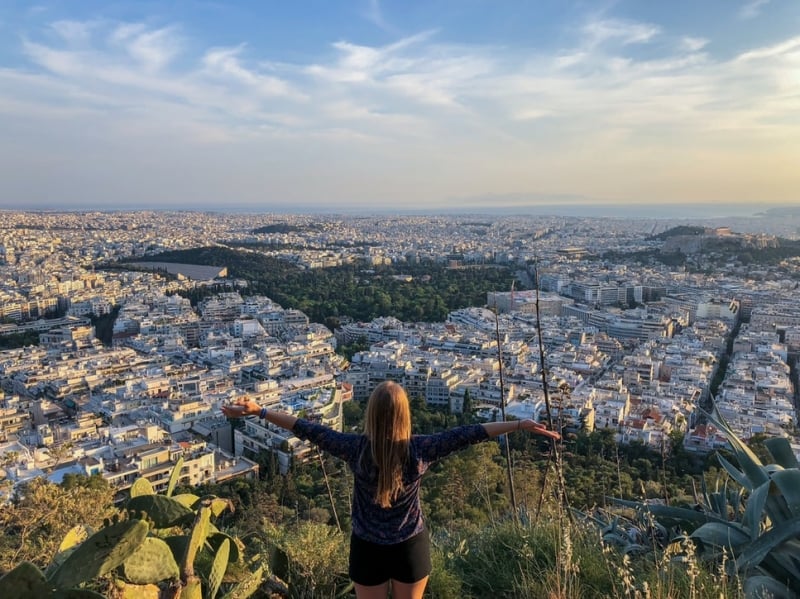
Another fairly important phrase when asking for directions. Don’t worry, I know that just learning this phrase isn’t enough. So I’ve included a table of some common places and nouns to match it, right at the very end of this article.
Quick, say “Effkharisto”. In case you forgot, it means thank you!
14. Pou mporo na vro – Where can I find…
Yes, yes, pou mporo na vro the key to your heart? -wink-
15. Tha ithela na pao – I would like to go to…
In case you forget how to pronounce this phrase, your next best bet is to whip out a map and point!
16. Boreeteh na meh voytheeseteh – Can you help me?
This phrase is incredibly crucial if you’re trying to ask directions from someone on the street. Would not recommend using this phrase with the Olympian Gods though. They’re not known to be all that helpful.
17. Pooh eemeh? – Where am I?
Speaking of the Olympians, in the unlikely event where you meet Dionysus in human form and get completely wasted before waking up somewhere you have no memory of, remember this phrase!
18. Pooh eeneh i tualéta? – Where is the toilet?
And of course, the most important location (in my opinion at least) every traveller needs to know. After all, a happy traveller is one who travels with a relatively comfortable bladder.
Ordering food
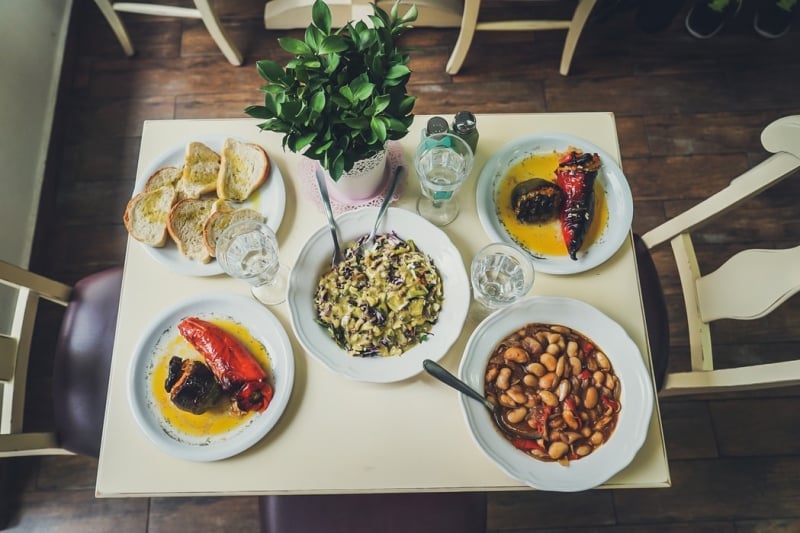
19. Tha ithela na parageilo parakalo – I would like to order, please
You could also raise your hand to attract attention. But hitting the waiter with this basic Greek phrase? Oof, they’ll be mighty impressed.
20. Tha ithela na eho – I would like to have…
Again, just knowing this phrase isn’t enough. So I’ve got a table below with some common nouns. Don’t worry, I won’t abandon you the way the Olympians abandon their children!
21. Tha mporousa na eho ligo nero? – Could I have some water?
Interestingly enough, Nero was a Roman Emperor who was famous for starting the Great Fire of Rome. But don’t worry, when you say “Tha mporousa na eho ligo nero”, you will indeed receive a glass of water.
22. Eemay chortofagos – I am vegetarian
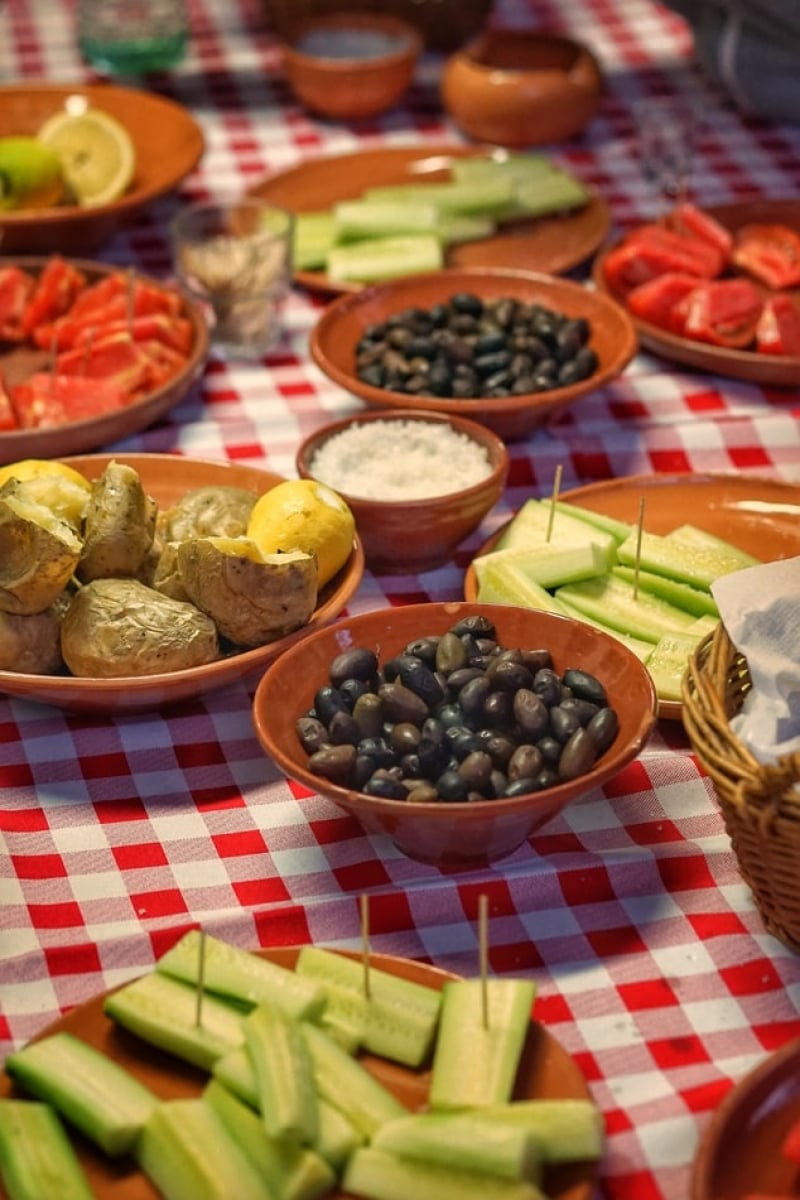
You probably might not need this phrase too much considering a lot of Greek food consists of vegetables and beans. However, if you want to err on the side of caution, just use this phrase.
23. To logariasmo, parakalo! – Bill, please!
The real question is, which among you is paying?
24. Poso kanee? – How much is this?
You probably should have asked this BEFORE you ordered. However, I do recommend learning this super useful phrase. This is especially handy when you’re visiting a market. Simply point at an object and utter this phrase and they’ll understand what you mean.
Also read: 7 Tips for Exploring Greece on A Budget
Other common phrases
25. Kreeahzomeh yeeahktro – I need a doctor
If you ever fall sick while travelling in Greece, use this phrase to get medical attention. I realise it’s quite a mouthful, so you could also say the word giatro, which means doctor.
26. Méno sto… – I am staying at…
In case you get into a taksi (taxi) and you’re not sure how to say “take me to”, just say Meno sto (hotel name) and the driver should know what to do with you.
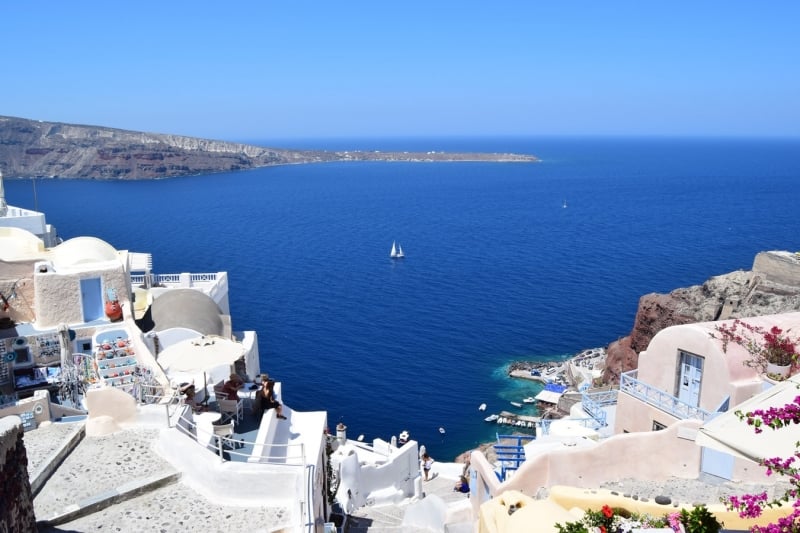
27. Xérete angliká? – Do you speak English?
But if you’re like me, the best Greek phrase is this one! While using basic Greek is quite a fun experience, I’d rather avoid any awkward misunderstandings. Hopefully, they say “neh” to my question!
28. Parakaló, miláte sigá-sigá – Can you speak slowly, please?
If you happen to meet an extremely excited Greek and they’re speaking too quickly, use this phrase to remind them that you’re not a native speaker!
29. Then katalaveno – I don’t understand
Of course, sometimes, no matter the speed they’re speaking at, you just can’t understand what they’re saying. In which case, use this!
30. S’agapo – I love you
Finally, when all else fails, pull an Aphrodite and use the language of love to communicate. Okay, just kidding, don’t do that. Instead, check out the table below for some common words you should know before your trip!
Nouns to remember
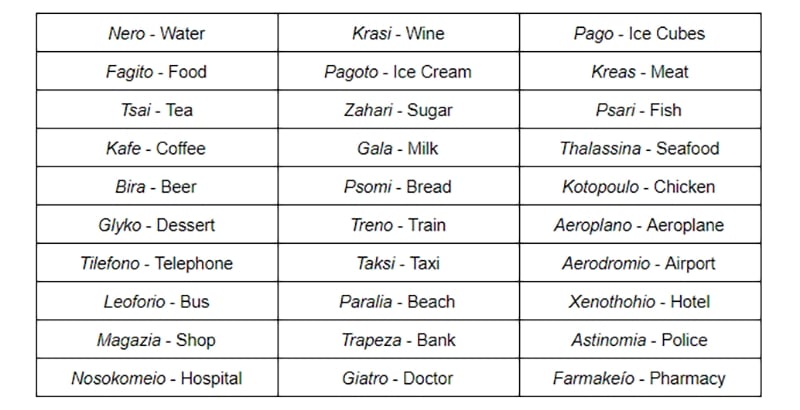
And there you have it, 30 essential Greek phrases to know before heading to Greece. The real question NOW is, which Greek destination should you visit? Santorini? Athens? Mykonos? So many great locations, so little time!




